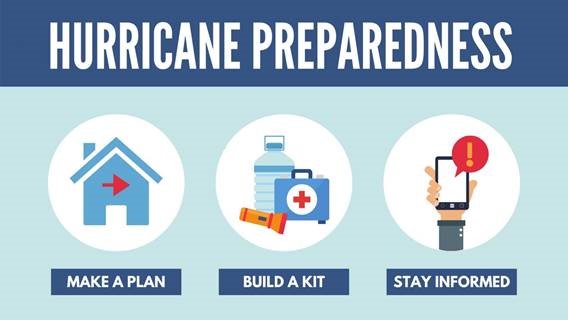Preparedness Key: 2022 Hurricane Season Underway

Thomas Nelson safety officials offer an important reminder. The 2022 hurricane season lasts through Nov. 30 and preparedness is crucial to your safety as well as to response and recovery efforts.
Preparation begins by identifying your personal risks. Key things to consider include the location of your residence (flood zone, etc.); type of insurance coverage (homeowners and flood); whether or not you have a plan; your evacuation route; as well as where and how will you obtain information.
Your plan should address the risks and requirements of staying versus evacuating. Ensure that everyone in your household knows and understands your hurricane plan.
Note these useful tips:
- Prepare an emergency kit with three to seven days or more worth of food, water, blankets, fuel, medicines, medical supplies, pet supplies, etc.
- Evacuate as advised if you reside in a mobile home or are camping in an RV
- Include plans for functional and social support services
- Adhere to all recommendations by emergency management officials for evaluation or sheltering in place
- Include plans for pets and their supplies; be aware if your local shelter doesn't accept pets, or certain types of pets only
- Prepare to store all lawn furniture and items that may become projectiles due to high winds, including trashcans and recycle bins and any uncollected yard debris
- Determine if your residence can withstand hurricane-force winds if you plan to shelter in place
- Make sure that you have a battery-powered National Oceanic Atmospheric Administration (NOAA) weather radio. A NOAA weather radio will allow you to monitor the weather and receive any messages about public safety
- Anticipate an interruption in government services, human services, financial services (ability to get cash), retail and other businesses
- Anticipate damages and loss of utilities
- Expect significant delays in emergency services responses if they can respond at all. Typically, emergency services stop responding to emergencies when conditions become unsafe to do so. Following a storm, damage can prevent emergency services from reaching many areas for an extended period.
To learn how to make your plan, visit ready.gov/make-a-plan.
Also, as part of being prepared, review your insurance coverage. An important thing to consider is whether your coverage matches or exceeds your assessment. Know your deductibles, coverage limits and policy declarations. Most homeowners' policies do not provide for water, sewer or flood damage claims. Homeowners should consider purchasing flood insurance and consult an insurance agent or contact the National Flood Insurance Program. Renters should consider renter's insurance with water damage coverage. It can take up to 30 days for flood insurance to take effect.
It's vital to Know Your Zone within Virginia's tiered evacuation zones. Designated A-D, the zones serve to give residents clear and specific evacuation or shelter-in-place information. When a serious storm is expected to affect Virginia's coastal regions, stay tuned to multiple media including social media because emergency management officials will release information by these means.
Officials recognize that emergency preparedness can be an enormous task for those who may not have the means. Information and referrals to many human services organizations that provide various aid are available by dialing 2-1-1 or going online at www.211virginia.org.
Severe weather can occur anytime. Early preparation and understanding your risks are key to being hurricane-ready, officials advise.
